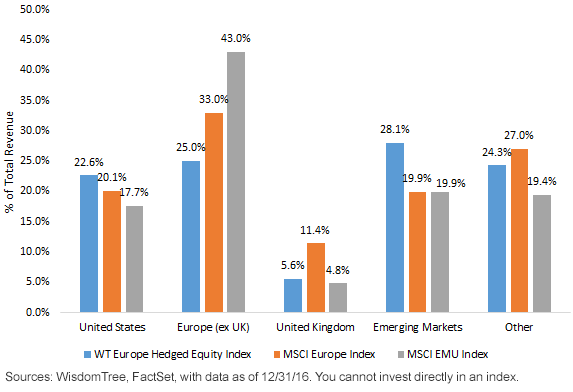As of this writing, the market was still adjusting to the new administration of President Donald Trump. It is difficult to form reasoned conclusions about how assets should be allocated, given the number of different policy concerns yet to be specified and decided.
Import Tariffs = Great Headline, Frightening Policy
One thing we’re hearing a lot about is tariffs or a border adjustment tax. With Trump’s protectionist rhetoric, it would seem we’re heading to some type of additional taxes on imports. While questions (When? With which specific countries? And with which specific details or provisions?) remain to be figured out, it’s worth analyzing the WisdomTree Europe Hedged Equity Index with this thought in mind, as well as considering the balance of other risks that may be on the table.
Valuation: The Starting Point
Looking at the estimated price-to-earnings (P/E) ratio of the WisdomTree Europe Hedged Equity, MSCI EMU and MSCI Europe Indexes, there is a discount of approximately 16% to 17% compared to that of the S&P 500 Index.1 With U.S. markets at or near record highs, we’re seeing more and more investors considering taking a portion of these profits and thinking about markets outside the U.S.
Relative valuation, therefore, is the point that begins the European equity conversation.
Risk #1: A Trump Import Tax Plan
Given concerns about Trump’s import tax threats, an important point of comparison among European-focused investments regards how much revenue is actually coming from the United States.
Tilting toward Exporters Appeared to Place Bigger Relative Emphasis on Emerging Markets












Leave A Comment